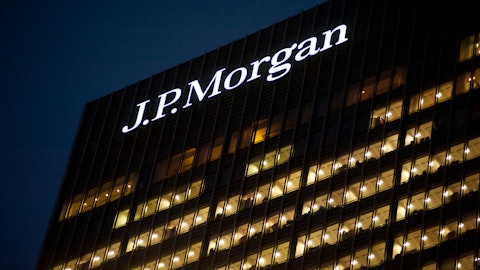International Business Machines Corp. (NYSE:IBM) is in trouble. Will it rebound, or is this the beginning (or middle) of the end?
The stock is down nearly 20% in the last month.
Source: Google Finance
Nonetheless, IBM remains a fairly popular stock among elite investors, including arguably the most elite investor of all, Warren Buffett. Buffett’s Berkshire Hathaway owns over 79.56 million shares of IBM worth over $12.94 billion. 58 other investors in our database were also long IBM on June 30, with the total being up by six from March 31. However, the value of the stakes held by the other 58 investors totaled less than $1.88 billion and would have left them collectively underweight IBM without Buffett’s gigantic position. All told, they held 9.30% of the company’s stock on June 30.
Here’s a startling fact about IBM – the company’s revenues were higher in 2007 than they are now. This sounds bad, but profits tell a different story.
IBM’s yearly profits are shown in the image below:
Profits have steadily marched upwards since 2005 before slight declines in 2013 and 2014. IBM’s revenues have fallen, but profits have trended upwards over the last decade.
IBM: Feast or Famine
IBM is currently trading for a price-to-earnings ratio of 9.6. The stock is dirt cheap right now. It also offers investors a strong 3.7% dividend yield.
If IBM manages to ‘fix’ its operations and return to steady growth then the company is an absolute bargain at current prices.
If the worry surrounding IBM were to lift, the stock could easily trade for a price-to-earnings ratio at 15 or 20. This would create enormous stock price appreciation gains for shareholders.
On the other hand, IBM is vastly overvalued right now if you believe the company is in a slow (or not so slow) decline. If that’s the case, then IBM is a value trap – and not worth owning at all.
There isn’t much of a middle ground with IBM. It either returns to growth, or it continues its slow decline.
Warren Buffett Has Given His Opinion
Warren Buffett currently has nearly $13 billion invested in IBM. IBM is his 3rd largest holding, behind only Coca-Cola (KO) and Wells Fargo (WFC).
Warren Buffett fist invested in IBM in 2011. He has continued to add to his position this year. Buffett’s IBM investment is interesting as he has famously avoided the technology sector.
When asked in the late 1990’s if he was (at the time) investing in technology stocks, Warren Buffett said the following:
“The answer is no, and it’s probably unfortunate. I don’t know what that world will look like in 10 years, and I don’t want to play in a game where the other guy has an advantage over me.”
Warren Buffett has also said that he ‘doesn’t understand’ technology. It’s difficult to take this statement at face value. Buffett is well known for his excellent investing quotes and easy-to-understand investment philosophy.
It is often lost on people just how smart Warren Buffett is. He is said to possess a photographic memory and be extremely adept at mental calculations. If Buffett can’t ‘get’ technology – then I think that’s more telling of the industry than of Buffett’s intellect.
I believe Buffett doesn’t invest in the technology industry because it changes rapidly. Rapid change makes it virtually impossible to sustain a strong competitive advantage for a long period of time. Very few companies have been able to – perhaps Microsoft (MSFT) and IBM are the best examples.
For Buffett to continue to invest in International Business Machines Corp. (NYSE:IBM) , he must see it has different somehow than most other technology stocks – he sees it as possessing a durable competitive advantage. If he didn’t, he wouldn’t put so much of his wealth into the stock.
IBM’s Management Has Also Given Its Opinion
IBM’s management must think the company has a long future ahead. The company has elected to use a significant portion of its cash flows to repurchase its shares.
If management thought the company’s future was very much uncertain, they wouldn’t repurchase shares (at least I hope they wouldn’t as they would just be throwing money away). The image below shows how the company has consistently repurchases shares:
It is important to take management’s proclivity for share repurchases with a grain of salt. Share repurchases help boost earnings-per-share, which is a metric that is often tied directly to executive compensation.
Share repurchases are normally good for shareholders. If you believe IBM’s future is very uncertain, share repurchases are a poor idea. On the other hand, if you believe IBM is very undervalued at current prices, share repurchases are one of the best uses of cash available to IBM.
IMB’s Competitive Advantage
There uses to be a truism that went like this:
“No one ever got fired for buying IBM”
That phrase shows how powerful IBM’s brand and reputation used to be. At one point, IBM controlled 65% of the IT industry.
IBM has lost a tremendous amount of market share. The company’s brand has also tarnished. Take the comment below from Seeking Alpha user ForgetBeta
“‘No One Ever Got Fired for Buying IBM’. It used to hold true, but no more. I work in IT for banks, i.e. traditionally entrenched moat style clients for IBM. In my experience the old adage which used to always hold true, now holds true in less than 5% of the cases (as opposed to 95% two decades ago).”
That’s not a good sign. All indications are that IBM’s brand based competitive advantage is declining.
Another intangible asset pro-IBM investors tout is the company’s impressive catalog of large customers. IBM does work with federal, state, and local governments as well as some of the largest corporations in the world. Its long corporate history has given it excellent connections.
I believe that IBM’s legacy will help the company to continue extracting profits from its more entrenched customers. Over the long run, this advantage will not in itself protect IBM.
IBM exists in a continuously changing industry.
“One constant throughout IBM’s over 100-year history has been the need to continually transform the company in an ever-changing industry. Our industry, our clients—and IBM itself—is in the midst of such a fundamental transformation.”
The quote above from the company’s 2014 annual report (page 28) speaks to how rapidly and continuously the technology industry changes. The rate of change is only accelerating. IBM is not the dominant player in the technology industry like it was in the 1960’s through 1980’s. The company is being outcompeted by nimbler organizations and services – like Amazon’s (AMZN) AWS.
After analyzing IBM’s business with a very long term view, one can see the company has been in a slow decline for at least a decade. The business may have grown some in that time period, but IBM’s brand and reputation based competitive advantage has slowly been eroding.
Recent News & Final Thoughts
IBM recently agreed to purchase The Weather Channel’s data collecting devices (and presumably its historical data) for around $2 billion. This acquisition is not transformative. It will not change IBM’s long-term trajectory.
The company is also being questioned by the SEC over possible improper revenue recognition (meaning accounting fraud). This only adds to the uncertainty surrounding IBM.
Could IBM turn around? Absolutely. Is it likely? I am not so sure. IBM has too many moving parts. The company appears to be in a long-term downward trend. It is being outcompeted and there are questions as to its direction.
Dividend investors looking for ~4% yields can choose far safer stocks for this level of yield. A partial list is below:
- Eaton (ETN) with its 3.9% dividend yield
- Verizon (VZ) with its 4.8% dividend yield
- Cummins (CMI) with its 3.8% dividend yield
- Caterpillar (CAT) with its 4.2% dividend yield
None of these companies are in the technology industry with the exception of Verizon – although telecommunications is really only related to the technology industry.
You don’t get bonus points for investing in hard-to-understand companies, or for the technology industry for that matter. IBM offers a solid yield and a low price-to-earnings ratio, but its significant qualitative risks make it a poor choice for investors looking for stability and dividends.
Warren Buffett has given International Business Machines Corp. (NYSE:IBM) his seal of approval. I certainly wouldn’t bet against the Oracle of Omaha and short IBM. I do think that IBM is a fairly risky investment. There are other high yielding companies with more certainty than IBM offers (like the 4 listed above).
Disclosure: None







